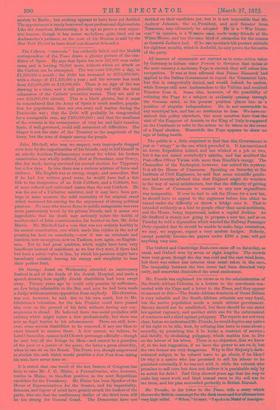Mr. Froude has explained his views as to the administration
of the South-African Colonies, in a lecture to the merchants con- nected with the Cape and a letter to the Times, and they appear- to amount to this :—The South-African dominion of Great Britain is very valuable and the South-African colonists- are very loyal, but the native population needs a much stricter government. Slavery should not be established, but there should be one strict law against vagrancy, and another strict one Mr the enforcement of contracts and a third against polygamy. The reports are-not-very clear, butes weunderstand Mr. Fronde, he woulddeprive any native of his right to be idle, first, by refusing him leave to roam about ; secondly, by punishing him if he broke a contract of service ; and thirdly, by abolishing polygamy, which enables him to live on the labour of his wives. There is no objection, that we know of, to the last suggestion, if we have the power to act on it, but the two former are very dangerous. Why is Her Majesty's dark- coloured subject to be refused leave to go, about, if he likes ? Or why is a native who has promised to sell his labour to be punished criminally if he has not. sold it, while the colonist who. promises to sell corn but does not deliver-it is punishable only by an action for debt? Earl Grey showed years ago that the way to make lazy races work and bind nomad races to the soil was to tax them, and his plan succeeded perfectly in British Burnish.


































 Previous page
Previous page